Algae: Reducing antibiotic use in pig production
![Outside shot of Balusson Farm. The 1,900 sow facility is performing very well for a farm of this size in France. [Photo: Stuart Lumb]](jpg/001_4_rb-image-2762688-848x565.jpg)
Benoît and Olivier Balusson, owners of a farrow-to-finish farm in Britanny, France, have embarked on an exciting mission: how to decrease antibiotics as much as possible? The farm applies a range of strategies, some of which involve algae.
Benoît and Olivier Balusson farm 1,900 sows in Britanny, an area of France which has around 80% of the country’s pigs. The farrow-to-finish unit is weaning just short of 30 pigs/sow/year which is commendable for such a large unit. Many other French units achieve this level of productivity, but often these are family farms with far fewer sows, which makes management much easier.
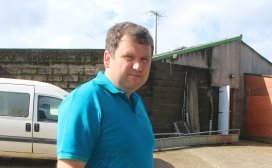
Balusson Farm, Bréhan, France
Balusson Farm is a closed farrow-to-finish facility with a capacity of 1,900 sows and gilts. In total 250 ha of arable land is also part of the business. The farm achieves 29.3 pigs per sow per year. The average number of piglets per litter is 13.29, with pre-weaning mortality being 13.9%. This all leads to 11.45 piglets being weaned per litter. The Balussons belong to the French Cooperl cooperative. The aim is to produce 49,000 finishers/year – some of the weaner pigs are finished locally by contracted producers.
Photo: Benoît Balusson, one of the owners of Balusson Farm [Photo: Stuart Lumb]
A low-antibiotic strategy
Antibiotics are a big thing for Balusson farm – the farm aims to use as few as possible. Currently only 2 antibiotics can be used on the Balusson farm. Amoxycillin is sometimes injected in piglets before weaning to manage arthritis. Also, trimethoprim/ sulfamethoxazole can be added to the drinking water to control streptococci, if necessary.
Ideally, however, antibiotic usage should be reduced further. In order to achieve that, an overarching strategy is being applied. This starts with creating the right conditions for a healthy environment, i.e. having high quality buildings with well-insulated rooms, decent building materials, healthy water as well as the availability of alternative health strategies, like e.g. vaccination.
Using algae in feed and hygiene
Within that scope, however, much more can be done to lower the dependence on antibiotics; the Balusson brothers aim for healthier production by focusing on both the nutrition and on the hygiene status. This is where the Balusson farm takes a different approach than most, as seaweed (algae) often form a key element in both their feed additives as well as hygiene products. Lines are short, as the Balusson brothers are related to Hervé Balusson, founder of Olmix. This French-based company has 20 years experience in extracting essential elements from algae for further use in livestock production.
Feeding strategy
The majority of the pigs at Balusson farm are fed home-mixed wet feed, called soup in French. This includes the group housed sows, whom are fed in a long trough with short barriers separating sows from each other, so that bully sows can’t eat too much feed at the expense of her neighbour.
At various moments in the farm, the feed rations are supplied with algae-based products or additives to enhance the nutritional quality.
Algae: to combat mycotoxins and piglet stress
Algae form the basis for instance for a mycotoxin binder – associating algae with clay and with other adsorbent materials, the company’s MT.x+ was created. For the Balusson farm, mycotoxin contamination is a widespread problem in cereals, so the binder is routinely added to the rations.
In addition, algae-derived products also play a central role in piglet feed around weaning. At Balusson farm, this takes place at 21 days of age (on average at 6 kg). To reduce the effects of stress and to boost immunity levels, the farm provides Searup for 3 to 5 days in the weaner feed. The product, combines the action of immunomodulating Marine Sulfated Polysaccharides (MSP), vitamins and amino acids. According to the company’s website, immunomodulating MSP contribute to a better immune response thanks to the activation of specific receptors of the innate immune system.
MSPs also have another function as they are observed to stimulate the secretion of protective mucin in the intestine. This forms the basis of the product Ecopiglet, which combines algae with micronised clays, all intended to reduce digestive problems. At the Balusson farm, the product is sprinkled on the heat pads from day 5.
![In total, 90% of the sows get served on Fridays, Saturdays and Sundays using a Ranco scanner for measuring back fat. [Photo: Stuart Lumb] In total, 90% of the sows get served on Fridays, Saturdays and Sundays using a Ranco scanner for measuring back fat. [Photo: Stuart Lumb]](/Resizes/420x315/PageFiles/66/27/32766/002/003_304_rb-image-2762692.jpeg)
Hygiene
Algae also have a role to play in enhancing the farm’s hygiene status. When algae extracts are mixed with selected minerals and oils, as well as with montmorillonite, a powerful and dried and micronised clay, a very hygroscopic powder is created (marketed as Mistral). It is used in various moments on the farm.
Newborn piglets get dunked in a tub of the powder at birth, to help them dry off quicker. This way they suckle faster.
At weaning, when the piglets are mixed, the strategy has a role to play as the product’s aroma is perceived to be pleasant. Dusting piglets with it masks the piglets’ own smell and so reduces fighting and hence stress.
After insemination, the powder is applied around the vulva to ensure optimal hygiene.
Apart from these measures, the emphasis on hygiene can be seen in the breeding approach. In order to avoid as much cross-contamination as possible, the farm was closed in recent years. Before that, breeding stock were sourced from a French nucleus; now only some semen is being brought in to maintain quality in the GGP females.
Last but not least, hygiene is certainly not compromised by Balusson’s take on castration – the farm doesn’t castrate. This has resulted in better production efficiency.
 Beheer
Beheer

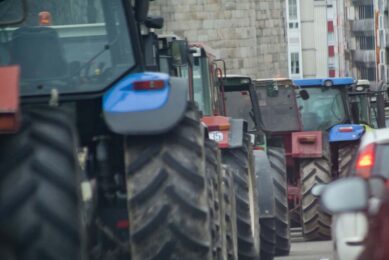
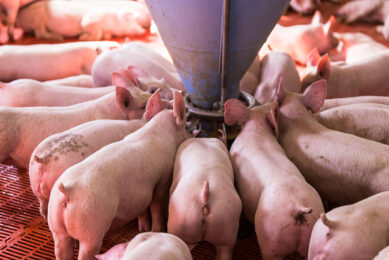
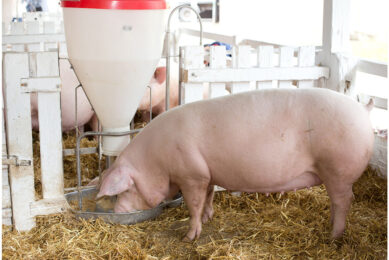
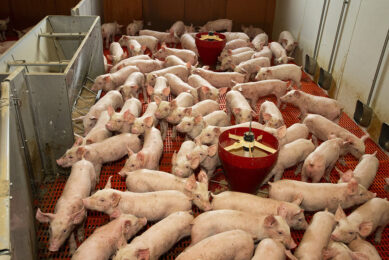



 WP Admin
WP Admin  Bewerk bericht
Bewerk bericht